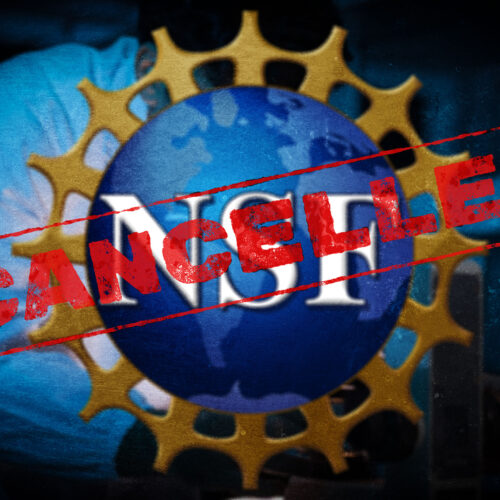Recent grant terminations are a symptom of a widespread attack on science.
Over the last two weeks, in response to Executive Order 14035, the National Science Foundation (NSF) has discontinued funding for research on diversity, equity, and inclusion (DEI), as well as support for researchers from marginalized backgrounds. Executive Order 14168 ordered the NSF (and other federal agencies) to discontinue any research that focused on women, women in STEM, gender variation, and transsexual or transgender populations—and, oddly, transgenic mice.
Then, another round of cancellations targeted research on misinformation and disinformation, a subject (among others) that Republican Senator Ted Cruz views as advancing neo-Marxist perspectives and class warfare.
During the previous three years, I served as a program officer at the NSF Science of Science (SOS) program. We reviewed, recommended, and awarded competitive research grants on science communication, including research on science communication to the public, communication of public priorities to scientists, and citizen engagement and participation in science. Projects my team reviewed and funded on misinformation are among the many others at NSF that have now been canceled (see the growing list here).
Misinformation research is vital to advancing our understanding of how citizens understand and process evidence and scientific information and put that understanding into action. It is an increasingly important area of research given our massive, ever-changing digital information environment.
A few examples of important research that was canceled because it threatens the current administration’s political agenda:
A project that uses computational social sciences, computer science, sociology, and statistics to understand the fundamentals of information spread through social media, because understanding how information flows and its impact on human behavior is important for determining how to protect society from the effects of misinformation, propaganda, and “fake news.”
A project investigating how people and groups incentivize others to spread misinformation on social media platforms.
A study identifying the role of social media influencers in addressing misconceptions and inaccurate information related to vaccines, which would help us develop guidance on how to ensure accurate information reaches different audiences.
Misinformation research matters
This work is critical on its own. Results of misinformation research inform how we handle education, public service announcements, weather warnings, emergency response broadcasts, health advisories, agricultural practices, product recalls, and more. It’s how we get people to integrate data into their work, whether their work involves things like farming, manufacturing, fishing, or something else.
Understanding how speech on technical topics is perceived, drives trust, and changes behavior can help us ensure that our speech is more effective. Beyond its economic impact, research on misinformation helps create an informed public—the foundation of any democracy. Contrary to the president’s executive order, it does not “infringe on the constitutionally protected speech rights of American citizens.”
Misinformation research is only a threat to the speech of people who seek to spread misinformation.
Politics and science
Political attacks on misinformation research is censorship, driven by a dislike for the results it produces. It is also part of a larger threat to the NSF and the economic and social benefits that come from publicly funded research.
The NSF is a “pass through agency”—most of its annual budget (around $9 billion) passes through the agency and is returned to American communities in the form of science grants (80 percent of the budget) and STEM education (13 percent). The NSF manages these programs via a staff that is packed full of expert scientists in physics, psychology, chemistry, geosciences, engineering, sociology, and other fields. These scientists and the administrative staff (1,700 employees, who account for around 5 percent of its budget) organize complex peer-review panels that assess and distribute funding to cutting-edge science.
In normal times, presidents may shift the NSF’s funding priorities—this is their prerogative. This process is political. It always has been. It always will be. Elected officials (both presidents and Congress) have agendas and interests and want to bring federal dollars to their constituents. Additionally, there are national priorities—pandemic response, supercomputing needs, nanotechnology breakthroughs, space exploration goals, demands for microchip technologies, and artificial intelligence advancements.
Presidential agendas are meant to “steer the ship” by working with Congress to develop annual budgets, set appropriations and earmarks, and focus on specific regions (e.g., EPSCoR), topics, or facilities (e.g., federal labs).
While shifting priorities is normal, cancellation of previously funded research projects is NOT normal. Unilaterally banning funding for specific types of research (climate science, misinformation, research on minoritized groups) is not normal.
It’s anti-scientific, allowing politics rather than expertise to determine which research is most competitive. Canceling research grants because they threaten the current regime’s political agenda is a violation of the NSF’s duty to honor contracts and ethically manage the funds appropriated by the US Congress. This is a threat not just to individual scientists and universities, but to the trust and norms that underpin our scientific enterprise. It’s an attempt to terrorize researchers with the fear that their funding may be next and to create backlash against science and expertise (another important area of NSF-funded research that has also been canceled).
Scientific values and our responsibilities
Political interference in federal funding of scientific research will not end here. A recent announcement notes the NSF is facing a 55 percent cut to its annual budget and mass layoffs. Other agencies have been told to prepare for similar cuts. The administration’s actions will leave little funding for R&D that advances the public good. And the places where the research happens—especially universities and colleges—are also under assault. While these immediate cuts are felt first by scientists and universities, they will ultimately affect people throughout the nation—students, consumers, private companies, and residents.
The American scientific enterprise has been a world leader, and federal funding of science is a key driver of this success. For the last 100 years, students, scientists, and entrepreneurs from around the world have flocked to the US to advance science and innovation. Public investments in science have produced economic health and prosperity for all Americans and advanced our national security through innovation and soft diplomacy.
These cuts, combined with other actions taken to limit research funding and peer review at scientific agencies, make it clear that the Trump administration’s goals are to:
Roll back education initiatives that produce an informed public
Reduce evidence-based policy making
Slash public investment in the advancement of science
All Americans who benefit from the outcomes of publicly funded science—GPS and touch screens on your phone, Google, the Internet, weather data on an app, MRI, kidney exchanges, CRISPR, 3D printing, tiny hearing aids, bluetooth, broadband, robotics at the high school, electric cars, suspension bridges, PCR tests, AlphaFold and other AI tools, Doppler radar, barcodes, reverse auctions, and far, far more—should be alarmed and taking action.
Here are some ideas of what you can do:
Demand that Congress restore previous appropriations, 5Calls
Advocate through any professional associations you’re a member of
Join science action groups (Science for the People, Union of Concerned Scientists, American Association for the Advancement of Science)
Talk to university funders, leadership, and alumni about the value of publicly funded science
Educate the public (including friends, family, and neighbors) about the value of science and the role of federally funded research
Write an op-ed or public outreach materials through your employer
Support federal employees
If you’re a scientist, say yes to media & public engagement requests
Attend local meetings: city council, library board, town halls
Attend a protest
Get offline and get active, in-person
There is a lot going on in the political environment right now, making it easy to get caught up in the implications cuts have on individual research projects or to be reassured by things that haven’t been targeted yet. But the threat looms large, for all US science. The US, through agencies like the NSF, has built a world-class scientific enterprise founded on the belief that taxpayer investments in basic science can and do produce valuable economic and social outcomes for all of us. Censoring research and canceling misinformation grants is a small step in what is already a larger battle to defend our world-class scientific enterprise. It is up to all of us to act now.
Mary K. Feeney is the Frank and June Sackton chair and professor in the School of Public Affairs at Arizona State University. She is a fellow of the National Academy of Public Administration and served as the program director for the Science of Science: Discovery, Communication and Impact program at the National Science Foundation (2021–2024).
76 Comments











